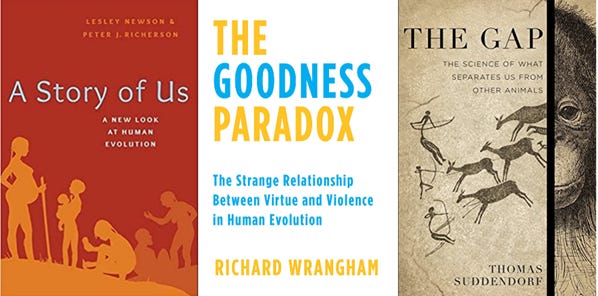At the time of this writing, I’m thinking about what I need for an upcoming work trip – what items I need, what meetings I have scheduled – so that I can be prepared. I’m planning ahead. I’m anticipating and predicting how the trip will unfold, who I will encounter, and what I will need for the hot and humid New Orleans weather.
While we take this cognitive capacity for granted, it’s quite unique among the animal kingdom. In fact, humans are the only species – as far as we can tell – that have the ability of foresight that, when combined with cumulative cultural evolution, kick-started the rapid advancement of humans as we know it. In, The Invention of Tomorrow: A Natural History of Foresight, Thomas Suddendorf, Jonathan Redshaw, and Adam Bulley tell us exactly how.
I loved this book. The Invention of Tomorrow is a synthesis of human evolution, developmental and cognitive psychology, and neuroscience explaining in detail what foresight is, how it develops, how it evolved, and what it means for the future of our civilization. It’s an expertly written book, highly informative, and enormously engaging.
Foresight, or our ability to create mental models, thoughts, and predictions about a future state – and plan accordingly – is a foundational part of our cognitive machinery that makes us who we are as humans. Our personal “time machine”, as the authors refer to it, is what makes our societies possible. It’s what set humans on the trajectory of apex predator and world dominator in an evolutionary blink of an eye.
As a developmental psychologist, I was particularly interested in the chapter on development of foresight across the lifespan. Although human babies are incredibly smart, the brain at birth is quite underdeveloped compared to adult capacity (part of why we have such a long childhood and need so much assistance in the early years). The hallmarks of foresight – like so many other ‘human’ cognitive capacities – gradually begin to come online around 4 – 5 years old.
This developmental period is a turning point in human development. Working memory capacity begins to increase so folks can hold more information in their mental workspace, facilitating more planning; their understanding of other minds and mental states begins to mature; and emotional regulation and behavioral inhibition start becoming easier. Human foresight is another piece of the complex cognition that makes us human.
Evolutionarily, we see the first hints of foresight over the last couple million years in extinct human species. Creating complex tools, coordinating hunting attacks, burial ceremonies, agriculture, time keeping devices, writing and symbolism, and eventually full blown cities. Foresight combined with cumulative culture and innovation to jump start and feedback loop process over evolution that is unique to humans.
The Invention of Tomorrow is a phenomenal book on a cognitive topic that I hadn’t much thought about until reading it. It’s an elegant combination of all my favorite science topics, brilliantly written, and providing a fresh perspective on cognition. It’s a must read for evolutionary scholars, especially, and any evo-curious folks as well.
Published: September 2022
Format: Advanced Hardcover
If you think this sounds interesting, bookmark these other great reads:
A Story of Us: A New Look at Human Evolution by Lesley Newson and Peter Richerson (2021)
The Goodness Paradox: The Strange Relationship Between Virtue and Violence in Human Evolution by Richard Wrangham (2019)
The Gap: The Science of What Separates Us from Other Animals by Thomas Suddendorf (2013)
This post contains affiliate links, allowing me to earn a small commission when you purchase books from the link provided. There is no cost to you, and this will allow me to keep this newsletter free and open to all. Happy reading!






